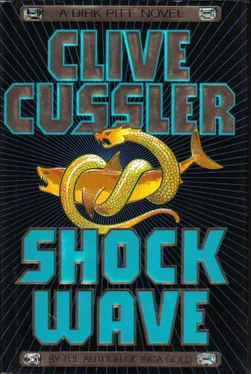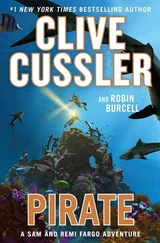Clive Cussler - Shock Wave
Здесь есть возможность читать онлайн «Clive Cussler - Shock Wave» весь текст электронной книги совершенно бесплатно (целиком полную версию без сокращений). В некоторых случаях можно слушать аудио, скачать через торрент в формате fb2 и присутствует краткое содержание. Год выпуска: 1996, ISBN: 1996, Издательство: Simon & Schuster, Жанр: Детектив, на английском языке. Описание произведения, (предисловие) а так же отзывы посетителей доступны на портале библиотеки ЛибКат.
- Название:Shock Wave
- Автор:
- Издательство:Simon & Schuster
- Жанр:
- Год:1996
- ISBN:978-0684802978
- Рейтинг книги:5 / 5. Голосов: 1
-
Избранное:Добавить в избранное
- Отзывы:
-
Ваша оценка:
- 100
- 1
- 2
- 3
- 4
- 5
Shock Wave: краткое содержание, описание и аннотация
Предлагаем к чтению аннотацию, описание, краткое содержание или предисловие (зависит от того, что написал сам автор книги «Shock Wave»). Если вы не нашли необходимую информацию о книге — напишите в комментариях, мы постараемся отыскать её.
Shock Wave — читать онлайн бесплатно полную книгу (весь текст) целиком
Ниже представлен текст книги, разбитый по страницам. Система сохранения места последней прочитанной страницы, позволяет с удобством читать онлайн бесплатно книгу «Shock Wave», без необходимости каждый раз заново искать на чём Вы остановились. Поставьте закладку, и сможете в любой момент перейти на страницу, на которой закончили чтение.
Интервал:
Закладка:
“Anything on your side?” asked Giordino.
“Nothing but gray, undistinguished rock poking through a blanket of white snow. I can only describe it as sterile monotony.”
Giordino made another notation on his chart and checked the airspeed against his watch. “Twenty kilometers from the whaling station, and no sign of passengers from the cruise ship.”
Pitt nodded in agreement. “Certainly nothing I can see that resembles a human.”
“Maeve Fletcher said they were supposed to put the second party ashore at a seal colony.”
“The seals are there all right,” Pitt said, gesturing below. “Must be over eight hundred of them, all dead.”
Giordino raised in his seat and peered out the port window as Pitt banked the helicopter in a gentle descending turn to give him a better view. The yellow-brown bodies of big elephant seals packed the shoreline for nearly a kilometer. From fifty meters in the air, they looked to be sleeping, but a sharp look soon revealed that not one moved.
“It doesn’t look like the second excursion group left the ship,” said Giordino.
There was nothing more to see, so Pitt swung the aircraft back on a course over the surf line. “Next stop, the Argentinean research station.”
“It should be coming into view at any time.”
“I’m not looking forward to what we might find,” said Pitt uneasily.
“Look on the bright side.” Giordino smiled tightly. “Maybe everybody said to hell with it, packed up and went home.”
“Wishful thinking on your part,” Pitt replied. “The station is highly important for its work in atmospheric sciences. It’s one of five permanently occupied survey stations that measure the behavior and fluctuations of the Antarctic ozone hole.”
“What’s the latest news on the ozone layer?”
“Weakening badly in both Northern and Southern Hemispheres,” Pitt answered seriously. “Since the large cavity over the Arctic pole has opened, the amoeba shaped hole in the south, rotating in clockwise direction from polar winds, has traveled over Chile and Argentina as high as the forty-fifth parallel. It also passed across New Zealand’s South Island as far as Christchurch. The plant and animal life in those regions received the most harmful dose of ultraviolet radiation ever recorded.”
“Which means we’ll have to pile on the suntan lotion;” Giordino said sardonically.
“The least of the problem,” said Pitt. “Small overdoses of ultraviolet radiation badly damage every agricultural product from potatoes to peaches. If the ozone values drop a few more percentage points, there will be a disastrous loss of food crops around the world.”
“You paint a grim picture.”
“That’s only the background,” Pitt continued. “Couple that with global warming and increasing volcanic activity, and the human race could see a rise in sea level of thirty to ninety meters in the next two hundred years. The bottom line is that we’ve altered the earth in a terrifying way we don’t yet understand—”
“There!” Giordino abruptly cut in and pointed. They were coming over a shoulder of rock that sloped toward the sea. “Looks more like a frontier town than a scientific base.”
The Argentinean research and survey station was a complex of ten buildings, constructed with solid steel portal frames that supported dome roofs. The hollow walls had been thickly filled with insulation against the wind and frigid cold. The antenna array for gathering scientific data on the atmosphere festooned the domed roofs like the leafless branches of trees in winter. Giordino tried one last time to raise somebody on the radio while Pitt circled the buildings.
“Still quiet as a hermit’s doorbell,” Giordino said uneasily as he removed the earphones.
“No outstretched hand from a welcome committee,” Pitt observed.
Without a further word he settled the helicopter neatly beside the largest of the six buildings, the rotor blades whipping the snow into a shower of ice crystals. A pair of snowmobiles and an all-terrain tractor sat deserted, half buried in snow. There were no footprints to be seen, no smoke curled from the vents. No smoke or at least white vapor meant no, inhabitants, none that were alive at any rate. The place looked eerily deserted. The blanket of white gave it a ghostly look indeed, thought Pitt.
“We’d better take along the shovels stored in the cargo bay,” he said. “It looks like we’re going to have to dig our way in.”
It required no imagination at all to fear the worst. They exited the aircraft and trudged through snow up to their thighs until they reached the entrance to the central building. About two meters of snow had drifted against the door. Twenty minutes later they had removed enough to pull the door half ajar.
Giordino gave a slight bow and smiled grimly. “After you.”
Pitt never doubted Giordino’s fortitude for a minute. The little Italian was utterly fearless. It was an old routine they had practiced many times. Pitt led the way while Giordino covered any unexpected movement from the flanks and rear. One behind the other they stepped into a short tunnel ending at an interior door that acted as an additional cold barrier. Once through the inside door, they continued on down a long corridor that opened into a combination recreation and dining room. Giordino walked over to a thermometer attached to the wall.
“It’s below freezing in here,” he muttered.
“Somebody hasn’t been tending the heat,” Pitt acknowledged.
They did not have to go far to discover their first resident.
The odd thing about him was that he didn’t look like he was dead. He knelt on the floor, clutching the top of a table, staring open-eyed and unwinkingly at Pitt and Giordino as if he had been expecting them. There was something unnaturally wrong and foreboding about his stillness. He was a big man, bald but for a strip of black hair running around the sides of his head and meeting in the back. Like most scientists who spent months and sometimes years in isolated outposts, he had ignored the daily male ritual of shaving, as evidenced by the elegantly brushed beard that fell down his chest. Sadly, the magnificent beard had been soiled when he retched.
The frightening part about him, the part that made the nape of Pitt’s neck tingle, was the expression of abject fear and agony on the face that was frozen by the cold into a mask of white marble. He looked hideous beyond description.
The eyes bulged, and the mouth was oddly twisted open as if in a final scream. That this individual had died in extreme pain and terror was obvious. The fingernails of the white hands that dug into the tabletop were broken and split. Three of them had left tiny droppings of icecrystalled blood. Pitt was no doctor and had never entertained the thought of becoming one, but he could tell this man was not stiffened by rigor mortis; he was frozen solid.
Giordino stepped around a serving counter and entered the kitchen. He returned within thirty seconds. “There are two more in there.”
“Worst fears confirmed,” said Pitt heavily. “Had just one of the station’s people survived, he’d have maintained the auxiliary motors to run the generators for electrical heat and power.”
Giordino looked down the corridors leading to the other buildings. “I’m not in the mood to hang around. I say we vacate this ice palace of the dead and contact Ice Hunter from the chopper.”
Pitt looked at him shrewdly. “What you’re really saying is that we pass the buck to Captain Dempsey and give him the thankless job of notifying the Argentinean authorities that the elite group of scientists manning their chief polar research station have all mysteriously departed for the great beyond.”
Giordino shrugged innocently. “It seems the sensible thing to do.”
Читать дальшеИнтервал:
Закладка:
Похожие книги на «Shock Wave»
Представляем Вашему вниманию похожие книги на «Shock Wave» списком для выбора. Мы отобрали схожую по названию и смыслу литературу в надежде предоставить читателям больше вариантов отыскать новые, интересные, ещё непрочитанные произведения.
Обсуждение, отзывы о книге «Shock Wave» и просто собственные мнения читателей. Оставьте ваши комментарии, напишите, что Вы думаете о произведении, его смысле или главных героях. Укажите что конкретно понравилось, а что нет, и почему Вы так считаете.












